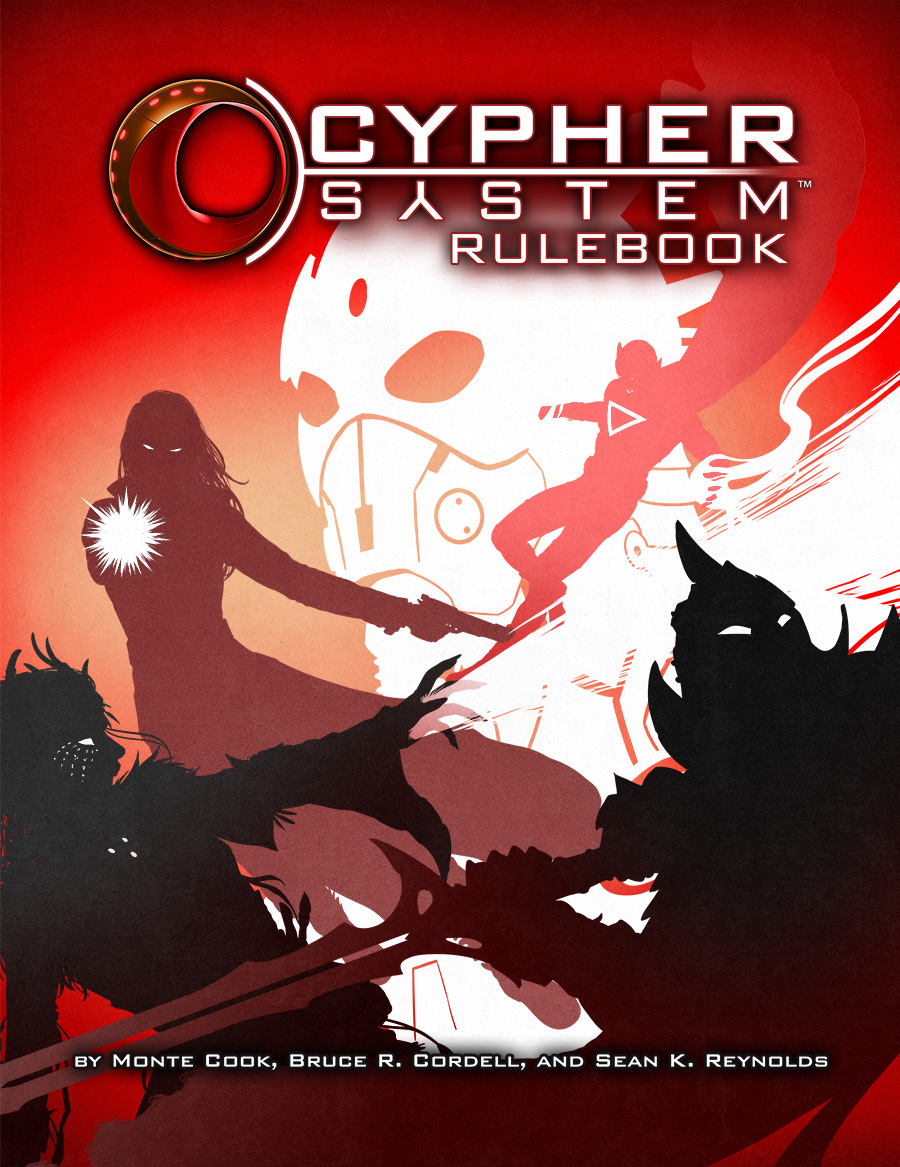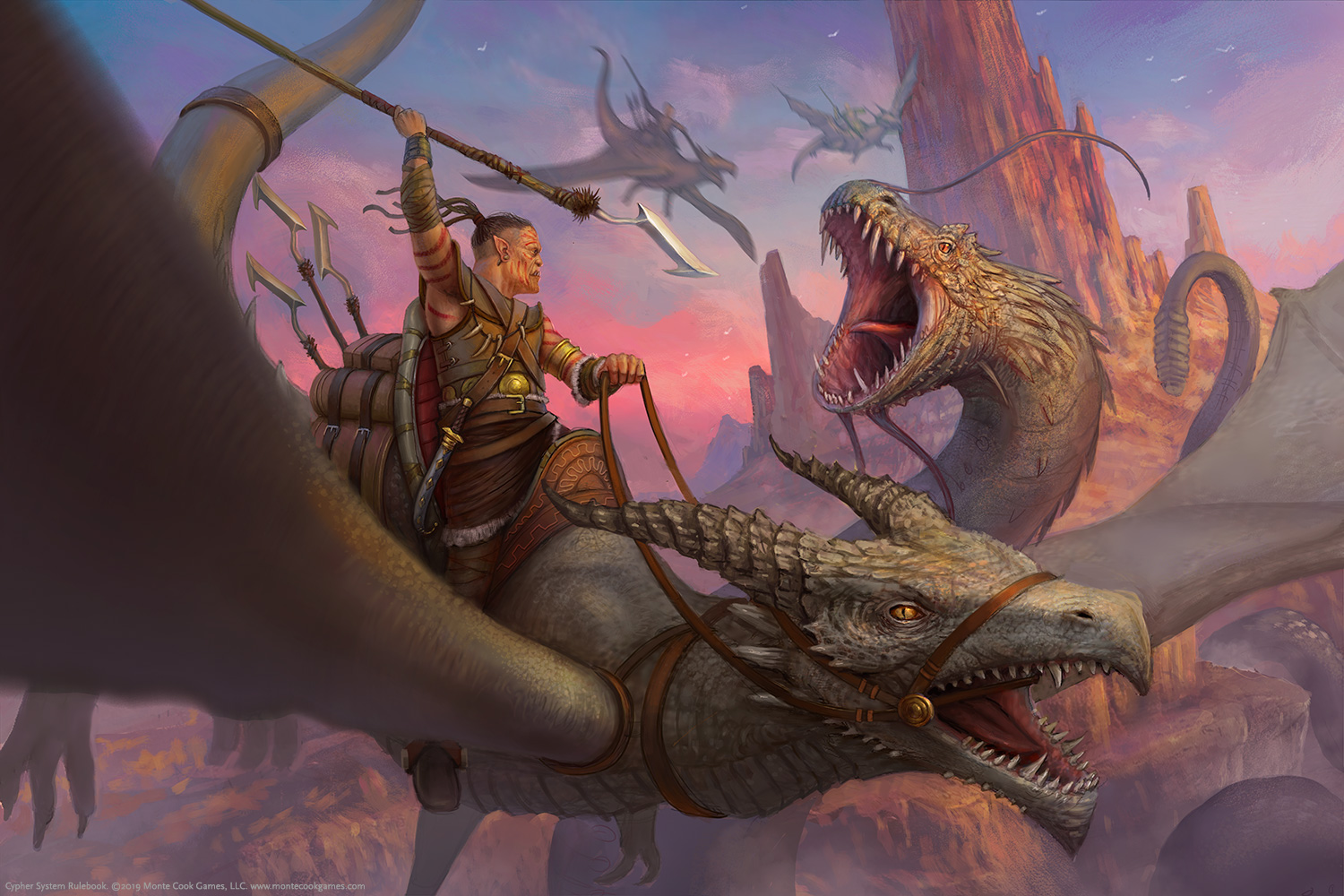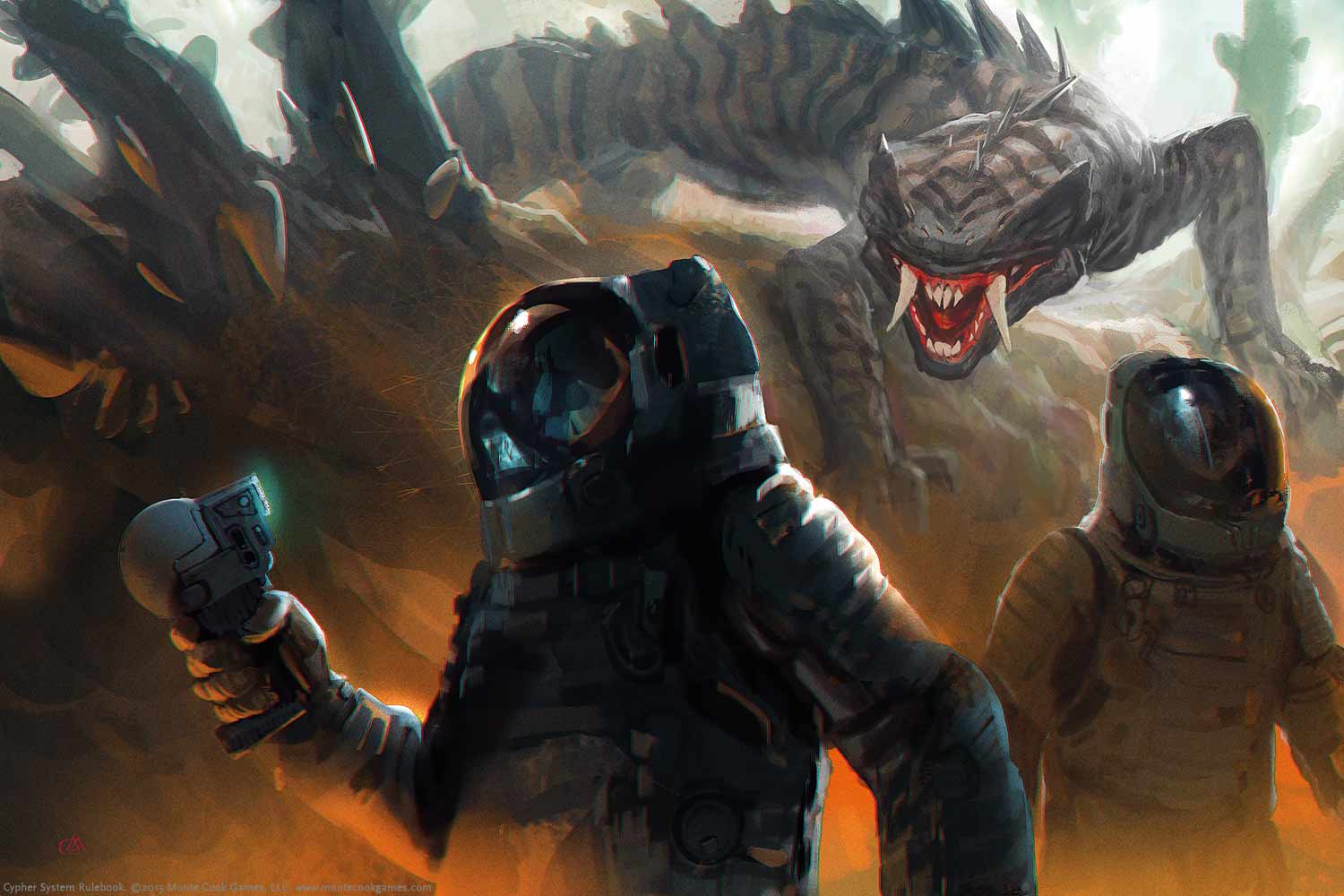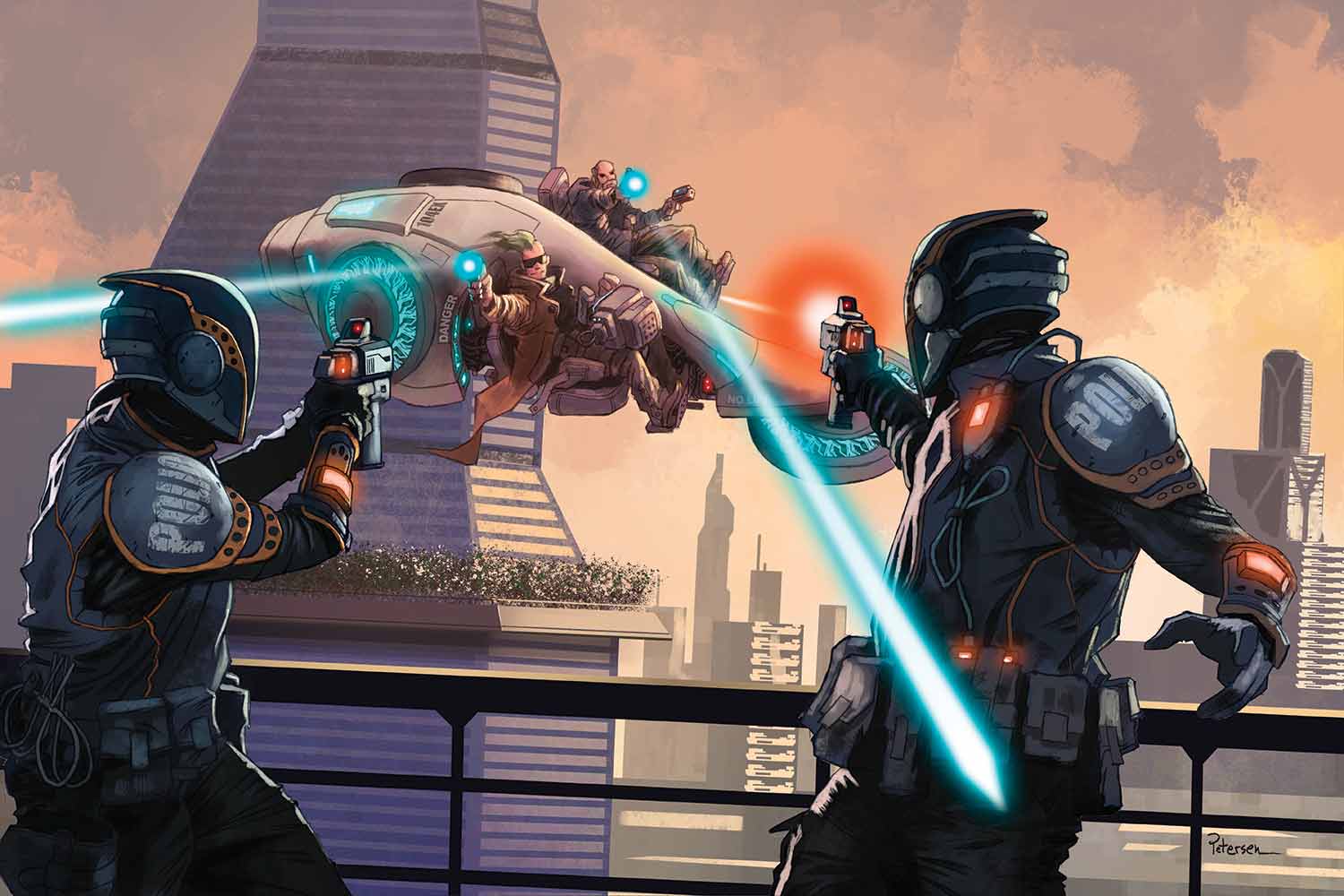Prologue – The Cypher System
Old Gods of Appalachia
The Old Gods of Appalachia Roleplaying Game is a tabletop RPG based on the critically-acclaimed podcast of the same name. Published by Monte Cook Games (MCG), Old Gods of Appalachia is a stand-alone game based on the Cypher System, the rules engine that powers the popular Numenera, The Strange, and a host of other games from MCG.
Set around the turn of the 20th century in an alternate version of Appalachia, Old Gods presents a bleak setting inspired by the superstitions and folklore of the real world. Here, in the dark hollers and hungry coal mines of the haunted earth, the witchy powers of the Green vie against the monsters of the dark. It’s part Appalachian legend and part Cthulhu.
If you’re one of the many, many fans of the Old Gods of Appalachia podcast, you’ll definitely want to check out the expanded lore and setting information in this book. Even if you’ve never heard a single episode of Old Gods, you’ll find more than enough here to run a horror-themed games based in the region. From fiendish railroad companies who buy and sell the souls of mortal men, to the nameless haints who walk the woods at night…Old Gods offers plenty of cool stuff for any horror RPG fan.
Want to know more about The Cypher System, the low-prep, versatile game engine that makes the Old Gods of Appalachia RPG tick? You can read a more in-depth description of Cypher System below.
RPG Guide: The Cypher RPG System
The Cypher System is a multi-genre roleplaying game at the heart of a number of Monte Cook Games’ (MCG) most popular titles. Rather than focusing on one particular flavor of RPG, such as fantasy or science fiction, The Cypher System provides rules to support a wide variety of settings right out of the gate. The single, 446 page rulebook contains everything you need to run a campaign in any of nine different genres, including fantasy, modern, science fiction, horror, romance, and others.
So how does the game work and what’s in the book? Let’s take a closer look.
Descriptions Plus Mechanics
The Cypher System is a moderately light ruleset designed to emphasize story over tactics. Rather than defining a character’s powers and abilities by their class, Cypher uses a brief, three-word description to describe every player character. So, instead of a paladin, your character might be an Honorable Warrior who Metes Out Justice or a Guarded Expert who Needs No Weapon. All three parts of the description, Honorable, Warrior, and Metes Out Justice, work to define the character both mechanically and within the story of whatever campaign you’re playing. For example, from a roleplaying perspective, an Honorable character is obviously someone who is trustworthy, fair-minded, and honest. Mechanically, they gain a bonus to sensing other people’s motives and to certain social skill checks where their honorable disposition can work in their favor.
obviously someone who is trustworthy, fair-minded, and honest. Mechanically, they gain a bonus to sensing other people’s motives and to certain social skill checks where their honorable disposition can work in their favor.
In a D&D sense, A Mysterious Explorer who Infiltrates and a Stealthy Explorer who Murders might both be considered rogues. In the Cypher System, those characters will play quite differently from one another, both in roleplaying and mechanically.
A lot of Cypher’s mechanics function similarly to how feats or powers work in other RPGs. If you’re familiar with D&D 3.5 and the games it inspired, you’ll recognize a lot of the DNA of Cypher. But the Cypher System is not a D&D clone. It incorporates elements from a number of RPGs and fits them into its own rules structure. And, because of the game’s toolkit nature, it’s pretty easy to mix and match the rules, reskinning things to suit whatever campaign or character you have in mind.
It’s All About Cyphers
One of the core aspects of the Cypher System is the game’s namesake: the cyphers. Put simply, a cypher is just a single-use item. Think potions or scrolls from D&D, or those cool gadgets that help James Bond break free from the villain’s lair…and then never show up again.
Each cyphers gives a character access to a unique and (potentially powerful) ability. Examples range from mind control, to force fields, to temporary stat boosts. Since each cypher can only be used once, their inclusion in your campaign doesn’t threaten the overall game balance.
As I alluded to before, the exact form cyphers take in your game will depend on the genre. In a fantasy game, they might be runes or magical relics. In a post-apocalyptic game, cyphers might be the leftover bits of technology from the ruins of civilization. In a modern or more realistic setting, where gadgets and magical gizmos might not be a good fit, cyphers might not have a physical form at all. They can just as easily manifest as bouts of good fortune and other subtle advantages.
Low Prep Gaming
The Cypher System prides itself on how easy it is for cypher GMs to prepare a game. While Cypher isn’t exactly a tactically heavy game, it’s also not as light as something like Fate or PDQ. The game definitely includes information on more fiddly rules for things like crafting items, piloting vehicles, and other more detailed rules. Each of the nine genre chapters also gets some specific optional rules as well, offering mechanics for things like horror and infatuation to your game. The vast majority of these mechanics, however, are strictly optional.
At its core, then, Cypher is a based on a very simple mechanic: the GM assigns a difficulty number between 1 and 10, converts that number into a DC, and the players try to match or beat that DC by rolling a d20. While this may sound similar to D&D 5E or D&D 3.5 on the surface, the Cypher System does a lot of work with its core mechanic. Nearly anything, from climbing a wall to stating out a brand new monster, can quickly and easily be handled by picking a number from the scale, doing some quick mental math, and rolling a d20.
with its core mechanic. Nearly anything, from climbing a wall to stating out a brand new monster, can quickly and easily be handled by picking a number from the scale, doing some quick mental math, and rolling a d20.
For a GM without a lot of prep time, or for anyone whose players are prone to taking unexpected turns far off the carefully planned path, Cypher’s approach is very helpful. Additionally, while the base mechanic is very simple, the GM isn’t utterly beholden to it. Given the time and inclination, there’s nothing stopping a Cypher GM from expanding each of their NPCs way beyond the 1-to-10 scale, giving them as much detail as a full player character if they so choose. However, the fact that game doesn’t require that level of prep in order to function is one of its greatest strengths.
More Than Just Combat
Unlike D&D, the Cypher System isn’t necessarily a combat-focused game. Certainly, a lot of the character abilities and cyphers are designed with combat in mind. But Cypher works really well as an RPG in which combats are few and far between. It accomplishes this in part by using an experience point system that rewards player-driven goals. And these goals can vary from PC to PC. One character might earn XP by learning new spells, while another works to founding a business or by successfully fostering and grow a relationship (romantic or otherwise) with an NPC.
Another way the Cypher System lends itself to combat-light games is through the way it handles player resource management. To understand what I mean here, consider how D&D traditionally handles adventuring: every player has to manage a certain number of limited resources for their character, be it hit points, spells, or both. Adventuring uses up those resources as you fight monsters, cast spells, and make your way deeper into whatever plot the DM has brewed up. You can  only go so far before you start to run low on HP and have to retreat, rest, and regroup.
only go so far before you start to run low on HP and have to retreat, rest, and regroup.
In Cypher, players characters spend down their ability scores (Might, Speed, and Intellect) in order to succeed on all kinds of in-game tasks. While spending the equivalent of your HP can seem a little counter-intuitive at first, especially if you’re coming at the game from a D&D perspective, the end result is pretty clever. Instead of your character’s limited resources only dwindling down through actual combat, the Cypher System achieves the same end whether you’re braving a steamy jungle, negotiating a fragile peace with the Romulan Empire, or rescuing civilians from a burning skyscraper.
Plus, just like in 5E, you can recover those spent points through rest.
Some Assembly Required
The Cypher System does what it sets out to do really well. It’s a low prep, multi-genre game that supports a story-first style with simple but versatile mechanics. Ultimately, however, it is a tool-kit. Using it effectively does require a certain amount of effort from the GM.
Think of it as a set of Legos with really good instructions. You can make a bunch of stuff with it, and it’s here to help you accomplish that, but you have to do some of the heavy lifting yourself. If you aren’t a GM who is comfortable reskinning existing rules on the fly, you’ll definitely have to do some work on the front end to make sure things run smoothly.
Fortunately, the rules themselves really do work well with very little prep. Most of the prep I’m talking about here is based on tweaking things like the descriptions  of cyphers and the names of Foci to match your campaign’s genre or theme. And you don’t have to do this on your own. Monte Cook Games publishes a whole line of genre books to help you make the Cypher System work for you.
of cyphers and the names of Foci to match your campaign’s genre or theme. And you don’t have to do this on your own. Monte Cook Games publishes a whole line of genre books to help you make the Cypher System work for you.
Getting Started With the Cypher System
If you’re interesting in checking out the Cypher System for yourself, here are my recommendations for books to pick up. Keep in mind that there’s more than what appears on this list, from genre books to settings that use the Cypher System. Presented here are just a few of my favorites.
The Cypher System Rulebook: This is the main rulebook. It’s a complete game with everything you need to build characters and create a cypher campaign in a variety of genres. As I said, you’ll need to do some setting prep to make it all come together, so you might consider picking up one or more of the other books on this list to help you.
Godforsaken: The Cypher System’s fantasy book. If you want to run something that resembles D&D using Cypher, this is where you should start. It’s also a great book to pick up if you’re most familiar with D&D and want to compare them in order to better understand how Cypher works. Requires the Cypher System Rulebook.
Claim the Sky: This book covers the comic book super hero genre in more depth. Claim the Sky’s discussion of comic book genre tropes is fantastic reading, and it’s worth picking up this book to read this section even if you don’t plan on running super heroes in the Cypher System. Requires the Cypher System Rulebook.
First Responders: Here’s an outside the box recommendation. This book is about playing firefighters, EMTs, and other emergency workers in the real world. If you’re looking to see the Cypher System pushed to its creative limits, or just want to see an RPG supplement that’s different than what you’ve seen before, consider this one. Also, the rules for treating hazards like floods and fires like enemies are excellent and easily adaptable to other genres. Requires the Cypher System Rulebook.
Stand-Alone Cypher System Games
The following games all use the Cypher System, but they don’t require the Cypher System Rulebook to function.
Numenera: The very first game to use the Cypher System. Numenera is arguably Monte Cook Games’ most popular line of RPGs. It’s a gonzo campaign world set in the far, far future that mixes science fiction and fantasy to create a very unique setting.
Old Gods of Appalachia: Based on the popular podcast of the same name. This is a stand-alone horror game set in an alternative version of the Appalachian Mountain region of the United States in the 1920s and 30s. Old Gods does a tremendous job reskinning cyphers to emulate a fictional version of the kind of folk magic present in the podcast’s setting.
